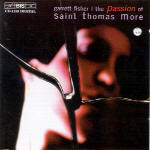The Passion of St. Thomas More is a chamber opera scored for three singers and four players (on English horn, guitar, Indian harmonium, and percussion). The plot, familiar to many from A Man For All Seasons, concerns Thomas More’s refusal to countenance Henry VIII’s divorce of Catherine of Aragon and sign a statement of support for the king’s subsequent schism with Rome, for which “crime” he was beheaded. American composer Garrett Fischer (b. 1970) focuses on the moment of decision itself and its effect on three principal characters: More (who must follow his conscience knowing the penalty for refusal to renew his loyalty to the king); his daughter Margaret (who must come to accept her father’s choice); and King Henry (forced to understand that his power to compel obedience is not absolute and that More has vanquished him spiritually). These singers also take on additional roles as “dark angels”, figures that elucidate the spiritual consequences and implications of the decisions that the human characters make. There’s also a role for a dancer, and a prelude and postlude consisting of a lovely traditional Norwegian poem that sets the stage by recalling the “old voices” of legendary times.
Fisher’s work, haunting in its simplicity, consists largely of chant-like, at times highly ornamental vocal lines (think of Hildegard of Bingen with some occasional counterpoint added and delicate instrumental accompaniments), and might superficially call to mind the music of composers such as John Tavener, save for the fact that Fisher writes music whereas Tavener patently does not. There are no screaming countertenors, pseudo-apocalyptic visions, crude tonal analogs, or obscure, autobiographically motivated sectarian philosophies forced on listeners here.
Indeed, Fisher’s laudable objective clearly has been to universalize the story through a ritualistic stylization that treats the music in the most traditional way possible: not as “representation” of some abstract concept or event, but as a means of elevating the expressive impact of the text. The libretto itself, by the composer, is as simple, eloquent, and direct as his setting of it, and finds room not only for its Norwegian prelude and postlude but also for a little Latin prayer and a touch of the poetry of William Carlos Williams (among other interesting things).
The result, while admittedly (and intentionally) slow moving and largely contemplative, is an extremely touching morality play about the consequences of choice, the need to be true to one’s self and follow one’s own conscience, and the struggle between temporal and spiritual values. The work stands pretty squarely in the tradition of Benjamin Britten’s Church Parables, and above all Holst’s Savitri. Even the choice of a soprano voice for the role of Thomas More has dual validity, first as a reinterpretation of an ancient tradition of male characters playing women (as in Japanese “Noh” plays or Britten’s own Curlew River), and second in order to establish the musical opposition of More and his daughter on the one hand (both sopranos) and Henry VIII (a baritone) on the other.
This beautifully recorded performance features the composer on Indian harmonium, an amazingly expressive and creamy-toned Taina Karr on English horn (no quacking or honking here!), two more excellent players, and three absolutely superb singers–none really better than the others. They present the music with tremendous concentration and also wring a surprising amount of variety from Fisher’s deliberately limited resources. Perhaps the most appealing thing about The Passion of St. Thomas More is the way it gently touches on spiritual matters without ever becoming preachy or pretentious, telling a human story with words and music that truly work well together. It succeeds most of all because Fisher never, ever, falls prey to the temptation to subordinate musical values for the sake of irrelevant, unmusical, philosophical point making, and that’s a remarkable achievement all by itself.
































